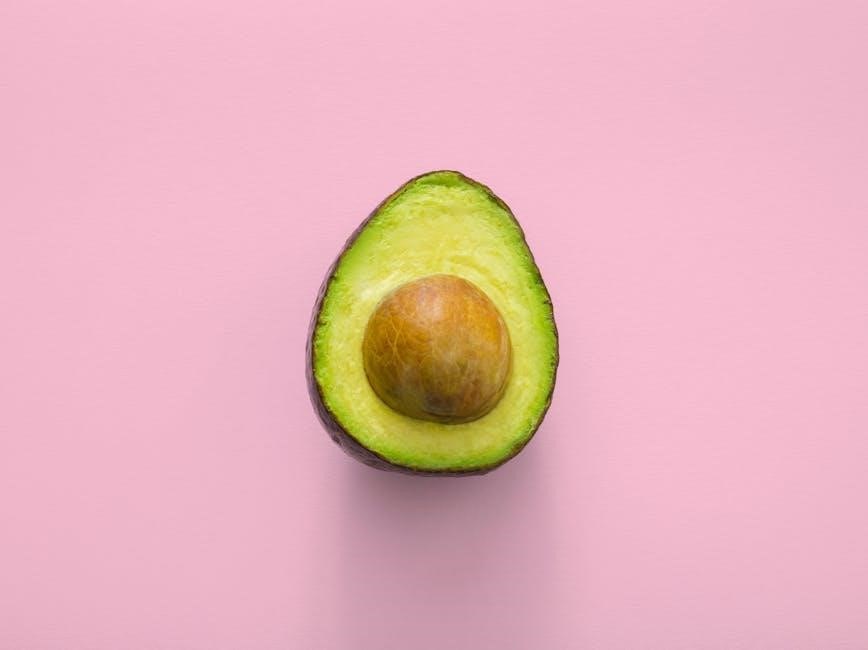The vegetarian keto diet combines plant-based eating with a low-carb‚ high-fat ketogenic approach‚ offering a unique path to weight loss and improved health outcomes․
What is a Vegetarian Keto Diet?
A vegetarian keto diet is a dietary approach that combines the principles of vegetarianism with the ketogenic diet‚ focusing on plant-based foods while maintaining a low-carb‚ high-fat intake․ It excludes animal products like meat‚ poultry‚ and fish but may include dairy or eggs‚ depending on the type of vegetarian diet․ The goal is to enter ketosis‚ a metabolic state where the body burns fat for energy instead of carbohydrates․ This diet emphasizes whole‚ nutrient-dense foods such as nuts‚ seeds‚ avocados‚ and tofu‚ while avoiding high-carb foods like grains‚ legumes‚ and starchy vegetables․ By adapting the traditional keto diet to plant-based preferences‚ the vegetarian keto diet offers a unique path to weight loss and improved health outcomes․
Benefits of a Vegetarian Keto Diet
The vegetarian keto diet offers numerous health benefits‚ making it a popular choice for those seeking weight loss and improved overall well-being․ By focusing on plant-based‚ high-fat‚ and low-carb foods‚ this diet promotes ketosis‚ a metabolic state that burns fat efficiently․ It can lead to significant weight reduction‚ particularly in visceral fat‚ and may improve blood sugar control‚ benefiting those with type 2 diabetes․ Additionally‚ the diet often results in reduced inflammation‚ enhanced mental clarity‚ and increased energy levels․ The emphasis on whole‚ nutrient-rich foods can also support better heart health by lowering cholesterol and blood pressure․ Furthermore‚ a vegetarian keto lifestyle encourages sustainable eating habits and can contribute to environmental benefits by reducing reliance on animal products․
Understanding Ketosis and Its Role in Weight Loss
Ketosis is a metabolic state where the body burns fat for energy instead of carbohydrates‚ producing molecules called ketones․ This process occurs when carbohydrate intake is significantly reduced‚ forcing the body to rely on stored fat reserves․ The ketogenic diet‚ by design‚ induces ketosis‚ making it an effective tool for weight loss․ When in ketosis‚ the body efficiently breaks down fat‚ particularly visceral fat‚ which is associated with health risks․ Lowering carbohydrate intake also reduces insulin levels‚ allowing the body to access and burn stored fat more readily․ This metabolic shift not only aids in weight reduction but can also improve blood sugar control and energy levels․ Maintaining ketosis requires careful meal planning‚ ensuring a balance of high fats‚ moderate proteins‚ and low carbs․ Free PDF meal plans are often used to guide individuals in achieving and sustaining ketosis for optimal weight loss results․

Key Principles of a Vegetarian Keto Diet Plan
- Emphasize high-fat‚ low-carb‚ plant-based foods․
- Incorporate vegetable proteins and healthy fats․
- Eliminate high-carb and non-vegetarian options․
- Stay hydrated and balance macronutrients․
- Consult a nutritionist for personalized plans․
Macronutrient Breakdown: Fats‚ Proteins‚ and Carbohydrates
A vegetarian keto diet focuses on balancing macronutrients to achieve ketosis․ Typically‚ fats make up 70-80% of daily calories‚ proteins 15-20%‚ and carbohydrates 5-10%․ Plant-based fats like avocados‚ nuts‚ seeds‚ and olive oil are emphasized․ Protein sources include tofu‚ tempeh‚ legumes‚ and eggs (if permitted)․ Carbohydrates are limited to low-carb vegetables‚ such as leafy greens‚ broccoli‚ and cauliflower‚ avoiding high-sugar fruits and grains․ This breakdown ensures the body burns fat for energy while maintaining muscle mass and overall nutrition․
Tracking macronutrient ratios is crucial to stay in ketosis and support weight loss․ Consulting a nutritionist or using a meal planner can help customize these ratios for individual needs and preferences․
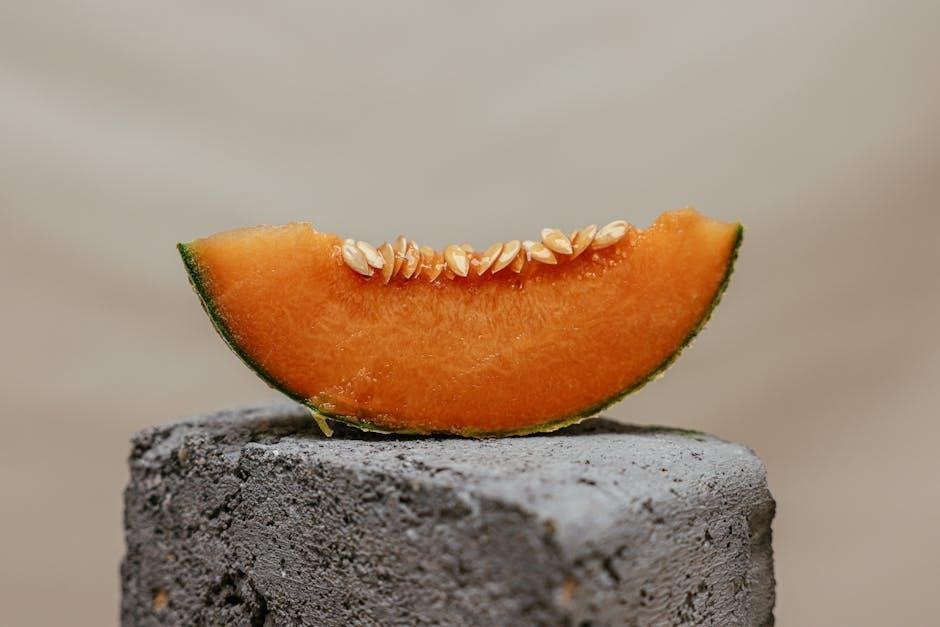
Approved Food List: Plant-Based Foods for Ketosis

Focusing on high-fat‚ low-carb plant-based foods is essential for a vegetarian keto diet․ Avocados‚ nuts (like almonds‚ macadamia‚ and walnuts)‚ and seeds (such as chia‚ flax‚ and hemp) are excellent sources of healthy fats․ Incorporate olive oil for cooking and dressings․ Low-carb vegetables like spinach‚ kale‚ broccoli‚ and cauliflower are also crucial‚ providing nutrients without excessive carbs․ Plant-based proteins such as tofu and tempeh are great additions‚ offering versatility in meals․ Portion control is vital‚ especially with nuts and seeds‚ to maintain ketosis․ These foods ensure a balanced and nutritious approach to the vegetarian keto lifestyle․
Foods to Avoid: High-Carb and Non-Vegetarian Options
On a vegetarian keto diet‚ it’s crucial to avoid high-carb foods and non-vegetarian options to maintain ketosis and align with dietary preferences․ High-carb foods such as grains (bread‚ pasta‚ rice)‚ starchy vegetables (potatoes‚ corn)‚ and sugary items (cakes‚ candies‚ sodas) should be eliminated․ Legumes like beans and lentils are also high in carbs and should be limited․ Non-vegetarian foods‚ including meat‚ poultry‚ fish‚ eggs‚ and dairy‚ are excluded from this diet․ Additionally‚ avoid processed foods‚ fruit juices‚ and high-sugar fruits like bananas and grapes․ These restrictions help maintain a low-carb‚ plant-based approach‚ ensuring adherence to both vegetarian and keto principles․ Sticking to these guidelines supports weight loss and overall health goals on the vegetarian keto journey․
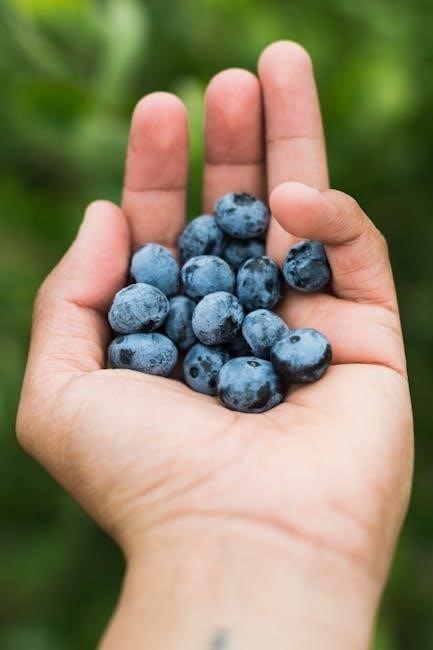
How to Transition to a Vegetarian Keto Diet
Transitioning involves planning meals‚ gradually reducing carbs‚ and incorporating keto-friendly plant-based foods․ Stay consistent‚ focus on whole foods‚ and monitor progress to ensure a smooth shift․
Step-by-Step Guide to Starting the Diet
Begin by assessing your current diet and identifying areas for change․ Set clear goals‚ such as weight loss or improved health․ Plan meals in advance‚ creating a 7-day schedule with keto-friendly vegetarian options․ Make a grocery list of approved foods like avocados‚ nuts‚ and low-carb vegetables․ Gradually reduce carbohydrate intake to minimize side effects like the “keto flu․” Replace high-carb foods with keto alternatives‚ such as zucchini noodles or cauliflower rice․ Stay hydrated by drinking plenty of water and consider increasing salt intake to avoid dehydration․ Track your progress using a food diary or app to monitor macronutrient intake and weight loss․ Finally‚ commit to consistency and patience‚ as it may take 1-2 weeks for your body to fully adapt to ketosis․
Common Challenges and Solutions
Adopting a vegetarian keto diet can present several challenges․ One common issue is ensuring adequate protein intake without relying on animal products․ Solutions include incorporating high-protein plant-based foods like tofu‚ tempeh‚ and legumes․ Another challenge is managing carb cravings‚ which can be addressed by substituting high-carb foods with keto-friendly alternatives such as cauliflower rice or zucchini noodles․ Social pressure and meal restrictions can also be daunting‚ but prepping meals in advance and communicating dietary needs can help․ Additionally‚ some individuals may struggle with maintaining sufficient fat intake‚ which can be resolved by adding healthy fats like avocados‚ nuts‚ and olive oil to meals․ Lastly‚ the “keto flu” is a common side effect during the transition‚ but staying hydrated and increasing salt intake can alleviate symptoms․ With the right strategies‚ these challenges can be overcome․
Importance of Meal Planning and Prep
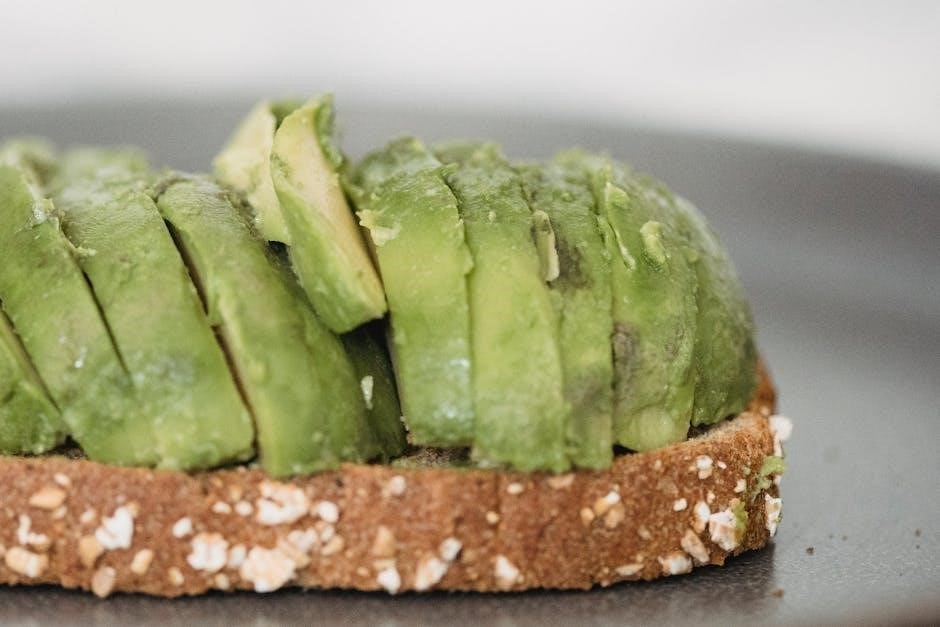
Meal planning and preparation are essential for successfully following a vegetarian keto diet․ Planning ensures consistency‚ helping you stay on track with your dietary goals․ It also prevents last-minute decisions that could lead to high-carb or non-compliant meals․ Prepping meals in advance saves time during the week and reduces the likelihood of relying on unhealthy options․ A well-structured plan guarantees that you meet your macronutrient needs‚ balancing fats‚ proteins‚ and low-carb vegetables․ Additionally‚ meal prep helps manage grocery shopping‚ reducing food waste and saving money․ By organizing your meals‚ you can avoid temptation and ensure that each meal aligns with your vegetarian keto lifestyle․ Consistent planning also fosters long-term sustainability‚ making the diet easier to maintain over time․

Sample 7-Day Vegetarian Keto Meal Plan
A well-structured 7-day meal plan provides a clear roadmap for breakfast‚ lunch‚ dinner‚ and snacks‚ ensuring keto-friendly‚ plant-based meals that are nutritionally balanced and sustainable․ Each day includes delicious‚ easy-to-prepare recipes using low-carb vegetables‚ healthy fats‚ and protein sources‚ making it easy to follow and maintain․ The plan avoids high-carb and non-vegetarian options‚ focusing on whole‚ nutrient-dense foods․ This approach helps maintain ketosis while keeping meals varied and enjoyable․ A sample plan might include keto smoothies‚ vegetable stir-fries‚ and hearty salads‚ all tailored to meet daily macronutrient needs․ Always consult a healthcare professional before starting any new diet․
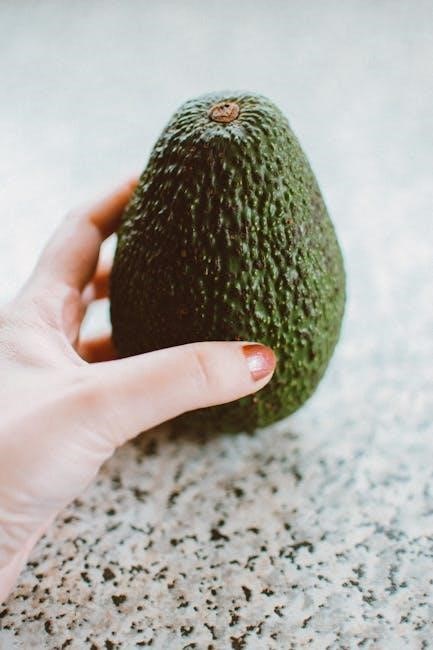
Breakfast Ideas: High-Fat‚ Low-Carb Recipes
Start your day with delicious‚ keto-friendly vegetarian breakfasts that are rich in healthy fats and low in carbohydrates․ Try a keto smoothie made with avocado‚ coconut milk‚ spinach‚ and chia seeds for a nutrient-packed start․ Another option is a veggie omelet with zucchini‚ mushrooms‚ and goat cheese‚ cooked in olive oil or coconut oil․ For a sweeter treat‚ enjoy low-carb almond flour pancakes topped with fresh berries and a drizzle of sugar-free maple syrup․ Egg-based recipes‚ such as shirred eggs with spinach and feta‚ are also excellent choices․ Incorporate healthy fats like coconut oil‚ butter‚ or cream cheese into your meals to keep you full and energized throughout the morning․ These recipes are easy to prepare and provide a balanced mix of fats‚ proteins‚ and low-carb vegetables to support ketosis and overall health․ Breakfast is a great way to kickstart your vegetarian keto journey with flavor and nutrition․
Lunch and Dinner Options: Balanced and Nutritious
For a satisfying vegetarian keto lunch or dinner‚ focus on nutrient-dense‚ low-carb‚ and high-fat meals․ A hearty cauliflower crust pizza topped with olive oil‚ roasted vegetables‚ and dairy-free cheese is a delicious option․ Stuffed zucchini boats with a filling of sautéed spinach‚ mushrooms‚ and vegan ricotta cheese‚ drizzled with olive oil‚ make for a balanced meal․ Another idea is a keto Cobb salad with avocado‚ spinach‚ cherry tomatoes‚ and a homemade vinaigrette․ Tofu or tempeh stir-fries cooked in coconut oil or sesame oil‚ paired with low-carb vegetables like broccoli or asparagus‚ are also excellent choices․ These meals are designed to provide sustained energy while keeping you in ketosis․ Incorporate a variety of colorful vegetables and healthy fats to ensure your meals are both nutritious and flavorful․
Snacks and Desserts: Keto-Friendly Vegetarian Choices
Keto-friendly snacks and desserts can be both delicious and nutritious‚ even on a vegetarian diet․ Opt for low-carb‚ high-fat options like fat bombs made from coconut oil‚ cocoa butter‚ or cream cheese․ Nuts and seeds‚ such as macadamia nuts‚ almonds‚ and chia seeds‚ are great snacks but should be consumed in moderation due to their carb content․ For desserts‚ consider keto cheesecake made with a dairy-free base or chocolate mousse using avocado or coconut cream․ Chia pudding with almond milk and a touch of stevia is another satisfying option․ Veggie sticks like cucumber‚ zucchini‚ or bell peppers with keto-friendly dips such as hummus or guacamole also make for healthy snacks․ These options ensure you stay within ketosis while indulging your sweet and savory cravings․
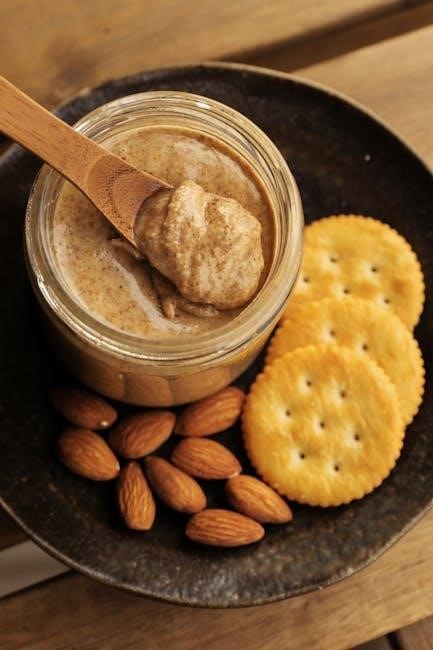
Tips for Maintaining a Vegetarian Keto Lifestyle
Stay motivated by tracking progress‚ setting realistic goals‚ and celebrating small victories․ Meal prepping and staying hydrated are crucial for long-term success and sustainability of the diet․
Staying Motivated and Avoiding Burnout
Staying motivated on a vegetarian keto diet requires a balanced approach to avoid burnout․ Start by setting realistic‚ achievable goals and celebrating small milestones‚ such as completing a week of meal prep or noticing improved energy levels․ Incorporate variety in your meals to prevent boredom‚ experimenting with new plant-based keto recipes․ Tracking progress through journaling or apps can also help maintain motivation․ Surround yourself with a supportive community‚ whether online or in-person‚ to share experiences and gain inspiration․ Lastly‚ practice self-care by allowing occasional treats within keto guidelines and ensuring adequate rest to avoid physical and mental fatigue․ Remember‚ consistency is key‚ and staying focused on long-term benefits will help you stay motivated and committed to your vegetarian keto journey․
Tracking Progress: Tools and Methods
Tracking progress on a vegetarian keto diet is crucial for staying on course and making adjustments as needed․ Use a food diary or mobile apps like MyFitnessPal or KetoDiet to log daily meals‚ ensuring you stay within keto macros․ Regularly monitor ketosis using keto strips or a blood ketone meter to confirm your body is in ketosis․ Track weight‚ body fat percentage‚ and measurements to observe physical changes․ Progress photos can also serve as visual motivation․ Additionally‚ monitor energy levels‚ mental clarity‚ and overall health improvements․ Adjust your diet based on the data‚ fine-tuning macronutrient ratios or food choices to optimize results․ Consistent tracking helps identify patterns and plateaus‚ enabling timely corrections to maintain steady progress on your vegetarian keto journey․
Long-Term Benefits and Sustainability
A well-planned vegetarian keto diet offers numerous long-term health benefits‚ including improved blood sugar control‚ enhanced heart health‚ and reduced inflammation․ Many people find it sustainable due to its focus on whole‚ nutrient-dense foods‚ which promote satiety and energy stability․ Over time‚ the diet can help reduce chronic disease risks‚ such as type 2 diabetes and cardiovascular issues․ Sustainability is achieved by incorporating a variety of plant-based keto-friendly foods‚ ensuring the diet remains interesting and satisfying․ Additionally‚ the environmental benefits of reducing animal product consumption make it an appealing choice for eco-conscious individuals․ By adopting a balanced and flexible approach‚ the vegetarian keto lifestyle can be maintained long-term‚ fostering overall well-being and resilience․ It’s a viable option for those seeking a healthier‚ more sustainable way of living․
The vegetarian keto diet is a great approach for weight loss and overall health‚ offering a satisfying and sustainable way to prioritize well-being and ethical eating choices․

Final Thoughts on the Vegetarian Keto Diet
The vegetarian keto diet offers a unique blend of health benefits‚ weight loss‚ and ethical eating‚ making it an appealing choice for those seeking a sustainable lifestyle change․ By focusing on plant-based‚ high-fat‚ and low-carb foods‚ individuals can achieve ketosis while maintaining their dietary preferences․ The diet not only supports weight management but also promotes improved blood sugar control and increased energy levels․ However‚ it requires careful planning to ensure adequate nutrition and variety․ With the right guidance‚ such as a free PDF plan‚ anyone can navigate the challenges of combining vegetarianism with ketosis․ Stay committed‚ and the rewards of a healthier‚ more balanced life will follow․ Celebrate small victories‚ and remember‚ consistency is key to long-term success․
Encouragement to Start Your Journey
Embarking on a vegetarian keto diet is an exciting step toward a healthier‚ more balanced lifestyle․ With a free PDF plan as your guide‚ you’ll have the tools to navigate this journey confidently․ Remember‚ every small change adds up‚ and even the first meal you prepare is a step in the right direction․ Don’t let doubts hold you back—this diet is flexible and rewarding‚ offering benefits like improved health‚ weight loss‚ and sustained energy․ Surround yourself with supportive resources and communities to keep you motivated․ Celebrate each milestone‚ no matter how small‚ and remind yourself why you started․ The vegetarian keto diet is more than a diet; it’s a sustainable path to wellness․ Take the first step today‚ and watch your goals become a reality!
